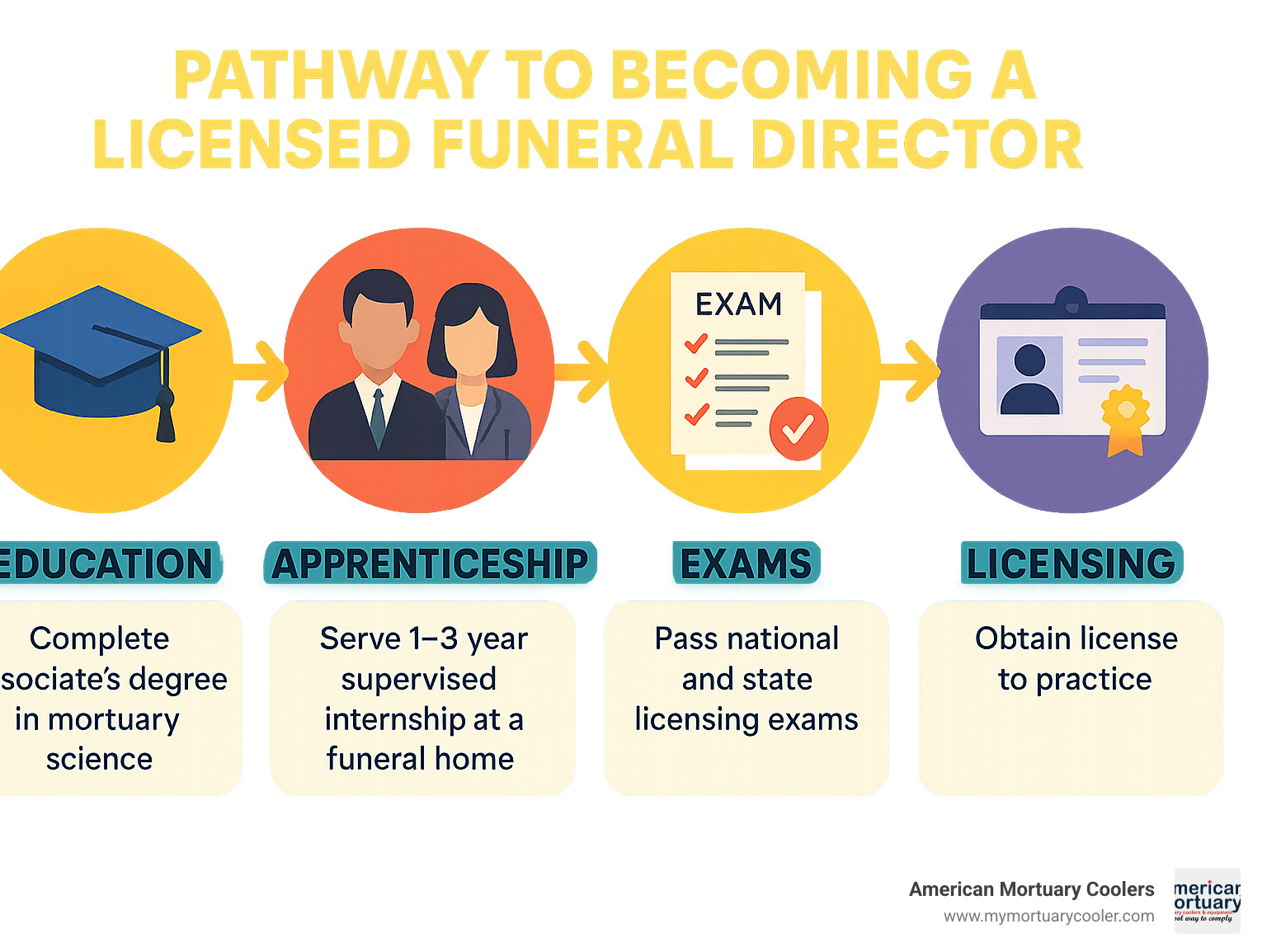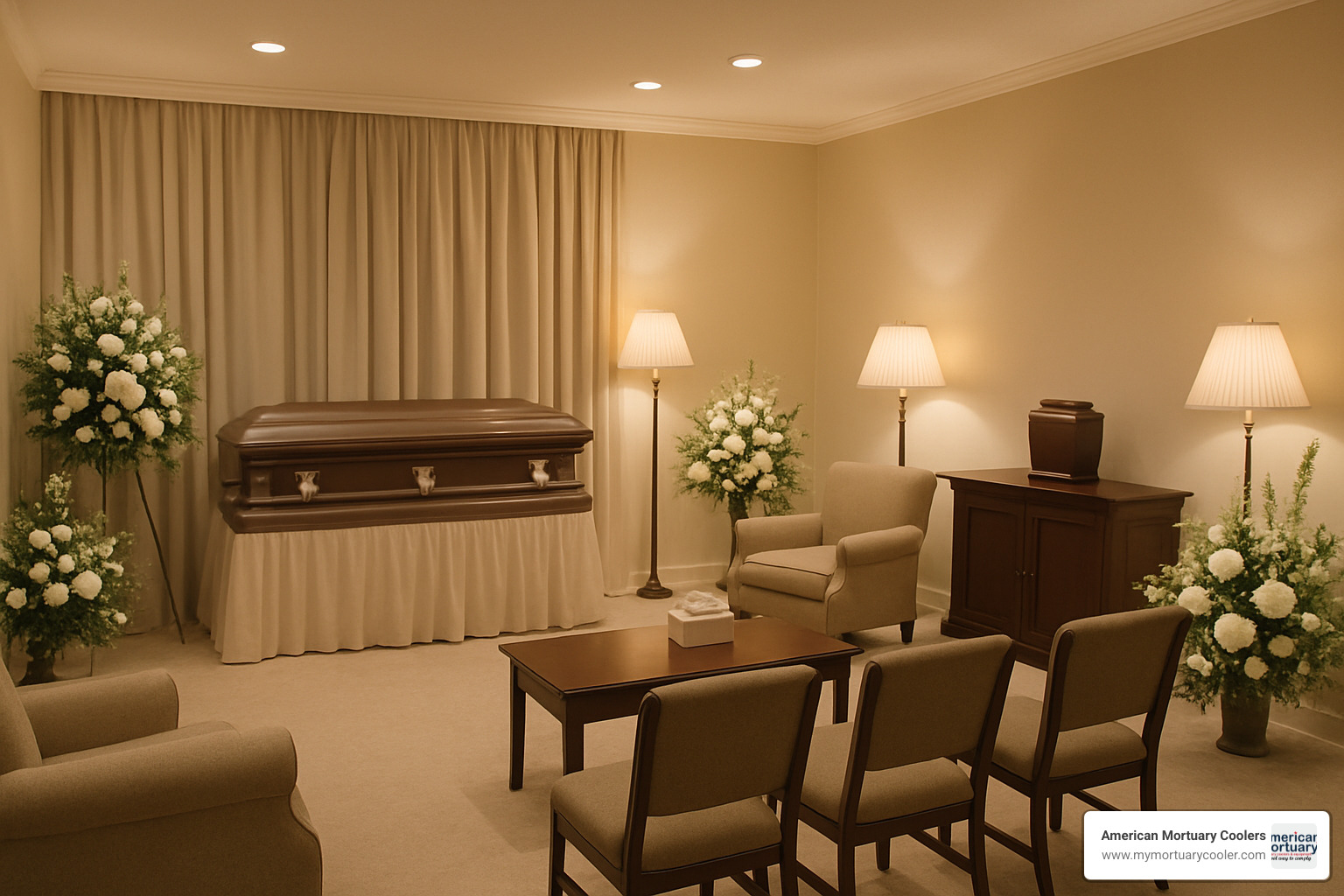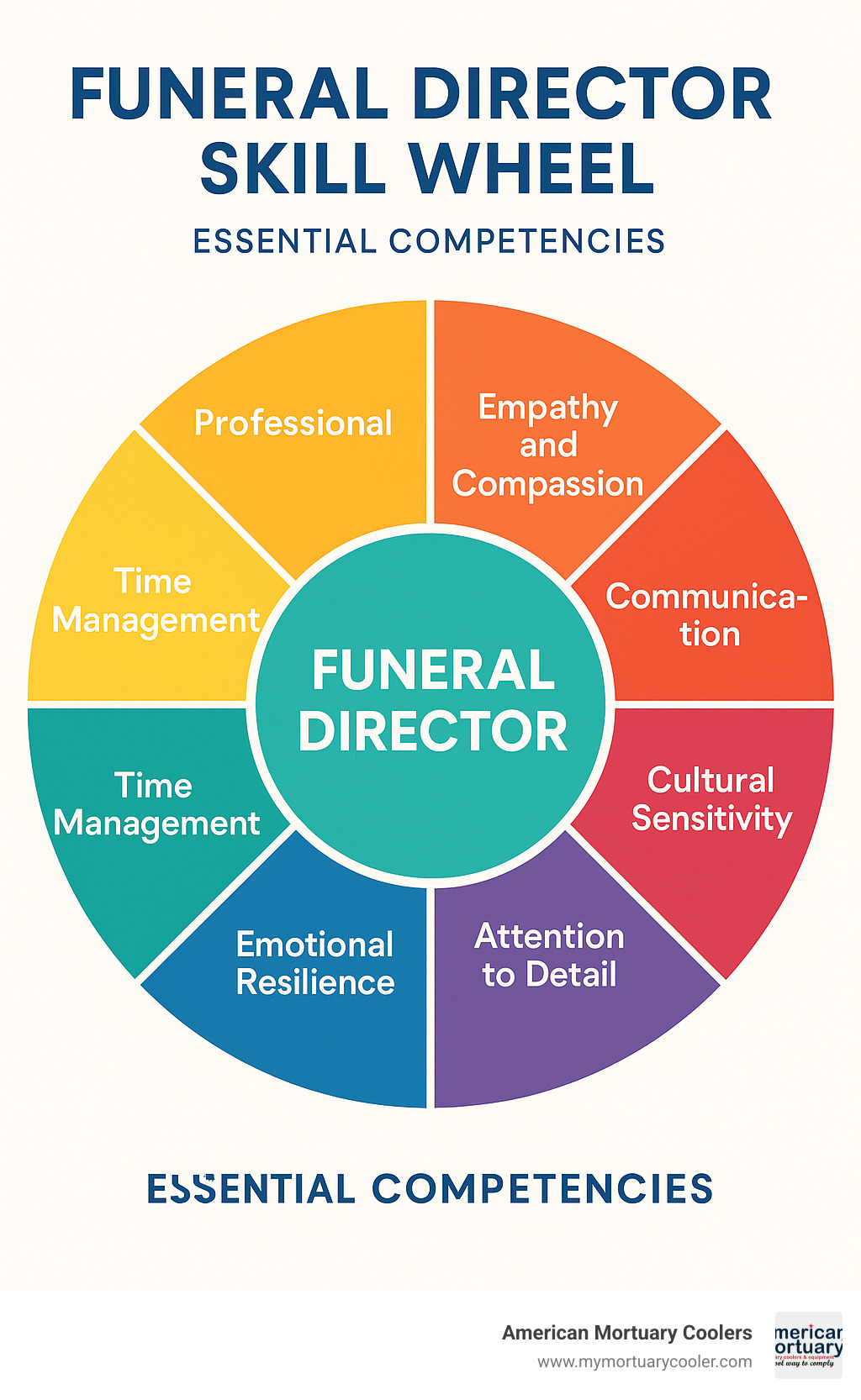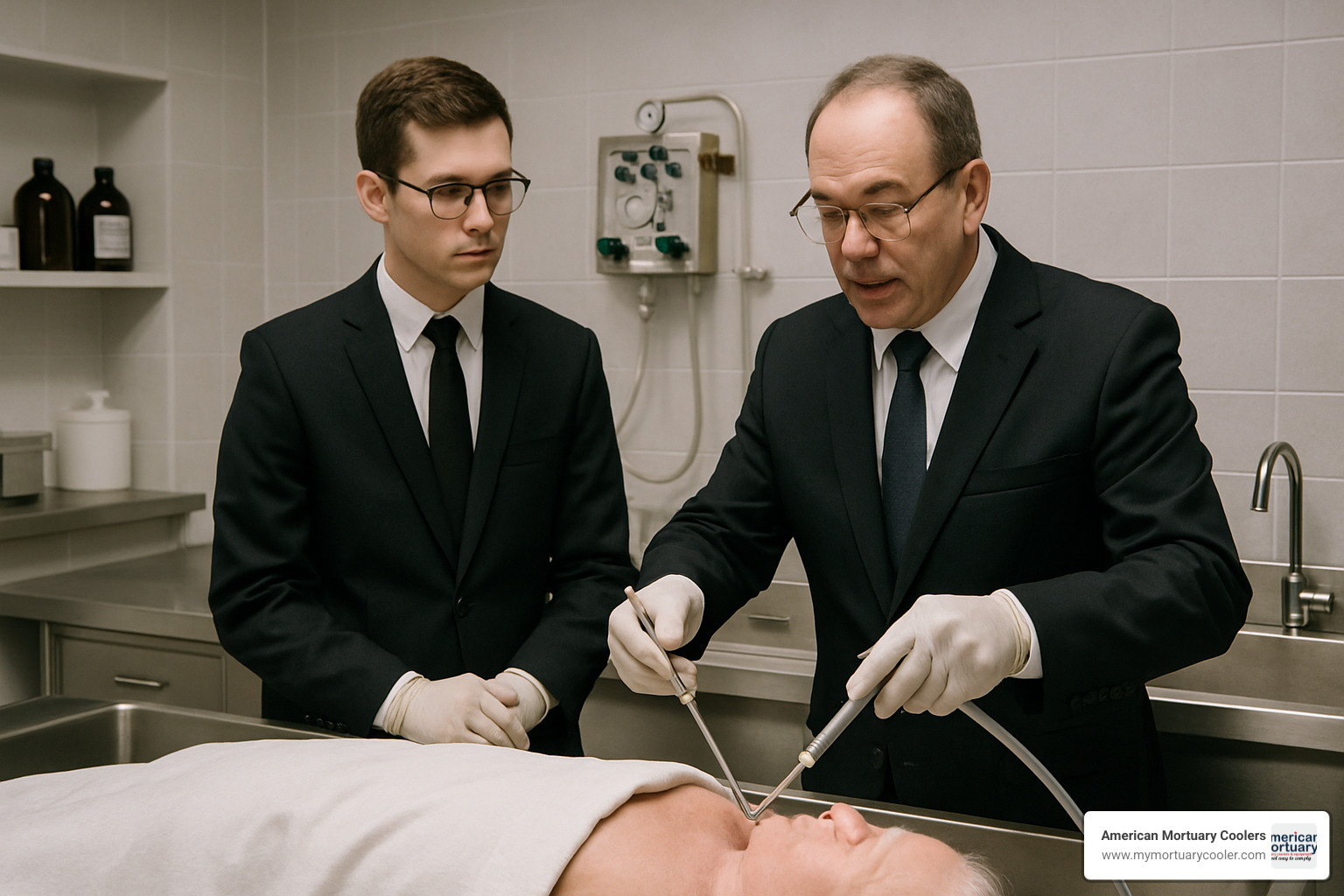
How to Become a Funeral Director Without Prior Experience
Starting on a Career in Funeral Service
How to become a funeral director involves several key steps that combine education, practical training, and licensing requirements. For those seeking a quick overview:
- Education: Complete an associate's degree (2 years) in mortuary science from an ABFSE-accredited program
- Apprenticeship: Serve a 1-3 year supervised internship at a funeral home
- Licensing Exams: Pass the National Board Exam and state-specific licensing tests
- Age Requirement: Most states require you to be at least 21 years old
- Continuing Education: Complete required CE credits to maintain your license
Becoming a funeral director is more than a career choice—it's a calling that combines compassion, science, and service to families during their most difficult times. This profession offers stability and personal fulfillment for those who find meaning in helping others steer grief and loss.
The funeral service profession welcomes people from diverse backgrounds. In fact, 56% of recent funeral service graduates were women, 39% were over age 30, and 85% had no prior family connection to the industry. Whether you're starting your first career or making a transition from another field, funeral service can provide rewarding work helping families honor their loved ones.
I'm Mortuary Cooler, and I've guided numerous professionals through the process of how to become a funeral director while ensuring they have the proper equipment and facilities to serve families with dignity. My experience in the mortuary equipment industry has given me unique insight into the practical aspects of funeral service operations that complement the educational journey.

Important how to become a funeral director terms:
What Funeral Directors Do & Key Skills
Behind every meaningful funeral service stands a dedicated professional who does far more than meets the eye. Funeral directors—sometimes called morticians or undertakers—serve as essential "last responders" who guide families through one of life's most difficult journeys. While many assume these professionals primarily work with the deceased, most of their time is actually spent supporting the living.
When I talk with funeral directors across the country, they consistently describe their role as a blend of compassion and practical expertise. Their work encompasses arrangement planning with grieving families, embalming oversight (though many delegate this to specialized embalmers), managing complex legal paperwork, providing genuine grief support, and handling all the logistics coordination that families simply couldn't manage on their own.
At American Mortuary Coolers, we've seen how these dedicated professionals balance the technical and emotional aspects of their work. From our Tennessee headquarters, we support funeral homes nationwide with reliable equipment that helps them maintain dignity in their operations.
Daily Responsibilities & Emotional Realities
The day-to-day life of a funeral director rarely follows a predictable schedule. One morning might begin with a gentle arrangement conference, guiding a family through difficult decisions about their loved one's final tribute. By afternoon, they might be coordinating with clergy and cemeteries, crafting meaningful obituaries, or overseeing a visitation service where they become both a steady presence and an invisible hand ensuring everything runs smoothly.

"This job isn't sad all the time—seriously," one funeral director shared with me. "Knowing you helped people through their mourning makes everything worthwhile." This sentiment echoes across the profession. There's profound satisfaction in hearing a family say, "Thank you for taking care of this and taking care of us."
But let's be honest about the emotional realities. How to become a funeral director isn't just about learning technical skills—it's about developing the emotional resilience to witness grief daily while maintaining your professional composure. It requires finding that delicate balance between genuine empathy and necessary emotional boundaries, a balance that successful directors cultivate throughout their careers.
Must-Have Soft & Technical Skills
If you're considering this meaningful profession without prior experience, you'll need to develop a unique blend of people skills and technical expertise.
The heart of funeral service lies in soft skills like genuine empathy, clear communication, and cultural sensitivity. You'll need meticulous attention to detail alongside the emotional resilience to remain steady during difficult moments. Successful directors also develop exceptional problem-solving abilities, time management, and a consistently professional demeanor that puts families at ease.
On the technical side, you'll build a foundation of knowledge including basic anatomy, preservation techniques, and funeral merchandise expertise. You'll become fluent in business management fundamentals, event coordination, and the complex web of regulations that govern funeral service.

Education and apprenticeship will help you develop many of these abilities, but the most successful funeral directors bring personal qualities that can't simply be taught in a classroom. They possess natural empathy, genuine respect for diverse traditions, and an authentic desire to serve families during their most vulnerable moments.
In my years working with funeral professionals through American Mortuary Coolers, I've noticed that those who thrive in this field find deep purpose in creating meaningful tributes that help families begin their healing journey. They understand that while the technical aspects matter tremendously, it's their humanity that families remember most.
Education & Licensing Roadmap
Taking the first steps toward becoming a funeral director means navigating a clear path of education, hands-on training, and testing. While each state has its own specific requirements, most follow a similar journey that I'll guide you through.
Mortuary Science Degrees & Accreditation
The cornerstone of your funeral service career starts with earning a degree from a program accredited by the American Board of Funeral Service Education (ABFSE). This accreditation isn't just a fancy stamp—it ensures your education meets national standards that licensing boards will recognize when you're ready to apply.
Most states require at least an associate's degree in mortuary science or funeral service. These programs typically include about 60 semester credits (or 90 quarter hours) and blend both technical funeral service knowledge with broader education. At least 25% of your coursework will cover general education subjects to help you develop well-rounded professional skills.
Your core mortuary science classes will cover fascinating and practical areas. You'll study sciences like anatomy and embalming, business aspects including funeral home management and merchandising, compassionate approaches through grief psychology and counseling, and the important legal and ethical frameworks that guide our profession. Most programs also include hands-on practicum requirements where you'll get real-world experience in funeral operations.
Program length varies—typically 2-4 years depending on whether you attend full-time or part-time. Some states require a bachelor's degree, while others accept an associate's degree with additional specific coursework.
The good news is that education options have become much more flexible in recent years. You can choose from:
- Traditional campus-based programs where you attend in person
- Online programs that include in-person lab components
- Hybrid options that blend distance learning with intensive on-site sessions
At American Mortuary Coolers, we've built relationships with funeral directors who graduated from programs across the country—from the Pittsburgh Institute of Mortuary Science to SUNY Canton to schools throughout the Southwest where we deliver our custom mortuary coolers.
For more comprehensive information, check out our detailed guide on everything you need to know about a mortuary science degree or explore affordable online funeral director programs. If cremation services interest you, the NFDA Cremation Certification Program offers specialized training.
Scholarships & Financial Aid Options
Paying for your mortuary science education doesn't have to be overwhelming. I've seen many future funeral directors successfully steer the financial aspects through several pathways.
Federal financial aid offers a solid foundation, including Pell Grants that don't need to be repaid, federal student loans with reasonable terms, and work-study programs that provide income while you learn. Remember to complete your FAFSA application to qualify for these options.
The funeral service profession also offers industry-specific scholarships that many students don't know about. The ABFSE Scholarship Program provides awards ranging from $500 to $2,500, with applications due in March and September. Remarkably, about half of all applicants receive these awards—much better odds than many other scholarship programs!
Other valuable funding sources include scholarships from the National Funeral Directors Association (NFDA), grants from the Funeral Service Foundation, and state funeral director association scholarships that support local students.
Don't overlook additional resources like veterans benefits if you've served, specialized scholarships for minority students, awards offered directly by your chosen mortuary school, and employer tuition assistance programs. Many funeral homes offer financial help in exchange for your commitment to work with them after graduation—a win-win arrangement that provides both education funding and job security.
From our Tennessee headquarters at American Mortuary Coolers, we've seen how these financial pathways have helped countless individuals enter this rewarding profession. With some research and planning, the financial aspect of how to become a funeral director can be managed effectively, allowing you to focus on your education and training.
How to Become a Funeral Director Without Prior Experience
Don't worry if you don't have family connections in the funeral industry—you're in good company! In fact, 85% of people entering funeral service education have no prior family ties to the profession. Breaking into this meaningful career is absolutely doable with the right approach and determination.
Starting from scratch? Here's your practical roadmap:
First, immerse yourself in the profession. Talk with several practicing funeral directors about their daily experiences—both the rewarding moments and the challenges. Attend mortuary school information sessions and browse the Occupational Outlook Handbook to understand career projections. Online communities for aspiring funeral professionals can also provide valuable insights from those who've walked this path before you.
Next, check the basic requirements. Most states require funeral directors to be at least 21 years old. Some states have specific citizenship or residency requirements—you might need U.S. citizenship or permanent residency. Each state has its own educational prerequisites too, so research your state's specific rules early in your journey.
When you're ready to move forward, select an ABFSE-accredited program that fits your life. Consider whether on-campus, online, or hybrid learning works best for your learning style and personal obligations. Maintaining good academic standing throughout your program will open more doors when you're ready for the next step.
The apprenticeship phase is where theory meets practice. Securing a quality apprenticeship can happen through school career services or by networking at state funeral director conventions. You'll need to complete 1-3 years of supervised practice (the duration varies by state) and document your work on a specific number of funeral cases (typically 25-40). This hands-on experience is invaluable for developing both technical skills and emotional intelligence.
After completing your education and apprenticeship, it's time to tackle the licensing exams. Prepare thoroughly for the National Board Exam (which includes both Arts and Sciences sections) and your state's jurisprudence exam covering funeral laws and regulations. Some states also require practical examinations to demonstrate your technical competence.
With exams behind you, apply for your professional license by submitting your application with all required documentation, paying the applicable fees, completing any required background checks, and participating in licensing interviews if your state requires them.
Becoming a funeral director is just the beginning—maintaining your license through continuing education (typically 5-12 hours annually) ensures you stay current with best practices and regulations throughout your career.
At American Mortuary Coolers, we've helped many new funeral directors set up their preparation rooms with the proper equipment. Our custom mortuary coolers are designed with both experienced and new funeral professionals in mind, and we ship directly to funeral homes across the contiguous 48 states.
Timeline: how to become a funeral director in 5 years or less
The journey to becoming a licensed funeral director typically takes 3-5 years, though this timeline can vary based on your educational path and state requirements:
| Timeline Stage | Traditional Path | Accelerated Path |
|---|---|---|
| Education | 2-4 years (Associate's or Bachelor's) | 2 years (Associate's) |
| Apprenticeship | 1-3 years (after graduation) | 1 year (concurrent with education where permitted) |
| Exam Preparation | 2-3 months | 1-2 months (intensive study) |
| Licensing Process | 2-3 months | 1-2 months (expedited) |
| Total Time | 3.5-7.5 years | 3-3.5 years |
Some states allow apprenticeships to happen alongside your education, which can significantly shorten your timeline. For example, in New York State, residents must complete a 12-month supervised residency in a registered funeral home, handling at least 40 competency cases and submitting quarterly reports. Other states might require up to three years of apprenticeship experience.
Checklist: how to become a funeral director with no experience
If you're starting without any connections to the funeral industry, building experience and relationships is key. Shadow a funeral director for a day to get a realistic picture of the profession. Then consider volunteering at a funeral home, even in non-technical roles—this shows your commitment and helps you understand the business from the inside.
Joining the National Funeral Directors Association as a student member connects you with resources and networking opportunities. Similarly, attending a funeral service convention in your region lets you meet professionals and learn about current industry trends. Finding a mentor in the profession can provide personalized guidance and insights that no textbook can offer.
Before committing to a program, visit several mortuary schools to get a feel for their culture and approach. Make sure to thoroughly research your state's licensing requirements through your state board to avoid surprises later. Throughout this process, deliberately build your professional network through industry associations and social media groups.

Many funeral homes are willing to hire individuals without experience in support roles like funeral attendants. These positions—which might include assisting with visitations, preparing facilities, and supporting funeral directors with logistics—provide valuable exposure to the profession while you complete your education. They also demonstrate your commitment when you're ready to apply for more advanced positions.
Developing relevant skills through coursework or volunteer work makes you more competitive. Finally, prepare financially for the education and apprenticeship periods by researching scholarships, saving, and understanding the realistic income expectations for entry-level positions in your area.
Becoming a funeral director is a journey that combines heart and skill—with the right preparation, you can build a fulfilling career helping families through their most difficult moments.
Frequently Asked Questions about How to Become a Funeral Director
What is the average salary and job outlook?
When considering a career as a funeral director, the financial picture is naturally a key concern. The good news is that funeral service offers both stability and reasonable compensation.
Most funeral directors earn around $58,200 annually, though this varies widely based on your location and experience. New professionals might start closer to $28,100, while seasoned directors can earn up to $94,860. Location matters too—Minnesota and New Jersey tend to offer higher salaries than places like Kentucky and Mississippi.
There's also a significant difference between owning and working for someone else. Funeral home owners typically earn around $145,007 per year, while employed funeral directors average about $92,634. In New Jersey, for example, newly-licensed directors who don't own their funeral homes earned a median of $66,820 in 2022.
As for job prospects, the outlook is quite promising. Two major factors are creating steady demand for funeral professionals:
First, America's population is aging, which naturally increases the need for funeral services. Second, many current funeral directors are approaching retirement age (55+), creating openings for newcomers. In most regions, there are actually more positions available than there are licensed professionals to fill them—making this a career with excellent job security.
For the most current employment data, you can visit the Bureau of Labor Statistics page on funeral service occupations.
Can my license transfer between states?
If you're considering a move during your funeral service career, license portability is something to research early. The ability to transfer your credentials varies dramatically between states.
Some states offer full reciprocity, meaning they'll recognize your out-of-state license without requiring additional testing. Others have limited practice agreements—like the arrangement between New Jersey and New York that allows funeral directors to transport remains across state lines without local supervision.
Many states fall into the partial reciprocity category, where they'll acknowledge your national exam scores and education but still require you to pass their state-specific jurisprudence exam. And then there are states with no reciprocity at all, requiring complete relicensing regardless of your experience.
The International Conference of Funeral Service Examining Boards (ICFSEB) maintains up-to-date information about reciprocity agreements. If you think you might relocate during your career, it's worth investigating these agreements before deciding where to initially become licensed.
For example, Pennsylvania-licensed funeral directors can bring bodies into New Jersey for final disposition without being accompanied by a New Jersey licensee—a practical arrangement that benefits professionals in both states.
How many continuing education credits are required?
Staying current in funeral service isn't just about keeping your skills sharp—it's a licensing requirement. Most states mandate continuing education (CE) to maintain your funeral director license, though the specifics vary considerably.
Typically, you'll need between 5-12 CE hours annually. Many states categorize these credits, limiting how many can come from certain sources (like online courses) or topics (such as business management versus technical skills).
Some states operate on annual reporting periods, while others use biennial cycles. New Jersey, for instance, requires 10 continuing education credits every two years. Several states also mandate specific courses in areas like ethics or OSHA compliance.
The National Funeral Directors Association offers excellent continuing education opportunities, including their NFDA Cremation Certification Program. This particular certification is valuable for funeral directors looking to expand their expertise in an increasingly popular disposition option. You can learn more about this program at the NFDA Cremation Certification Program page.
At American Mortuary Coolers, we understand how important proper equipment maintenance is to your professional practice. Our custom mortuary coolers are designed with the latest technology to help you maintain the highest standards of care. We're also happy to provide information about equipment maintenance that may qualify for technical CE credits in some states.
For those interested in learning more about the equipment funeral directors use daily, you might find our comprehensive guide to funeral director equipment helpful as you prepare for your career.
Conclusion
The journey to becoming a funeral director without prior experience is like building a bridge—methodical, structured, and ultimately connecting you to meaningful work. While it requires dedication and persistence, this path leads to a profession where you'll make a genuine difference for families facing their most vulnerable moments.
Today's funeral service continues to evolve in exciting ways. We're seeing more personalized ceremonies, creative uses of technology, and diverse memorial options that reflect our changing society. Yet amid all this innovation, the heart of funeral service remains steadfast: providing compassionate care and creating meaningful ceremonies that help families take their first steps on the grief journey.
Here at American Mortuary Coolers, we take pride in supporting funeral professionals across the country. From our home base in Tennessee, we craft custom, durable mortuary coolers that ship directly to funeral homes throughout the contiguous 48 states. Whether you're launching a new funeral home or refreshing existing facilities, our team truly understands the unique equipment needs that support dignified care.
If you're considering how to become a funeral director, I'd encourage you to take these practical next steps:
Reach out to your state licensing board to understand their specific requirements. Every state has different rules, and knowing them early saves headaches later. Visit several funeral homes in your area—you'll be amazed how each has its own approach and atmosphere. Have honest conversations with current funeral directors about both the rewards and challenges they face. Take time to research ABFSE-accredited programs that match how you learn best. And perhaps most importantly, develop a realistic financial plan for your education and apprenticeship period.
The funeral profession welcomes individuals who blend technical skill with genuine compassion. As you grow in your career, you'll find that proper equipment—including reliable mortuary refrigeration—isn't just a practical necessity but essential to providing the dignified care families deserve. We at American Mortuary Coolers are here to support your professional journey with custom solutions designed specifically for funeral service professionals from Johnson City to New York, Chicago, Dallas, and everywhere in between.
For more information about mortuary equipment that can support your professional practice, explore the complete guide to funeral home coolers and reach out with any questions about your specific needs. We're here to help you serve families with dignity and care—because at the end of the day, that's what this profession is all about.



